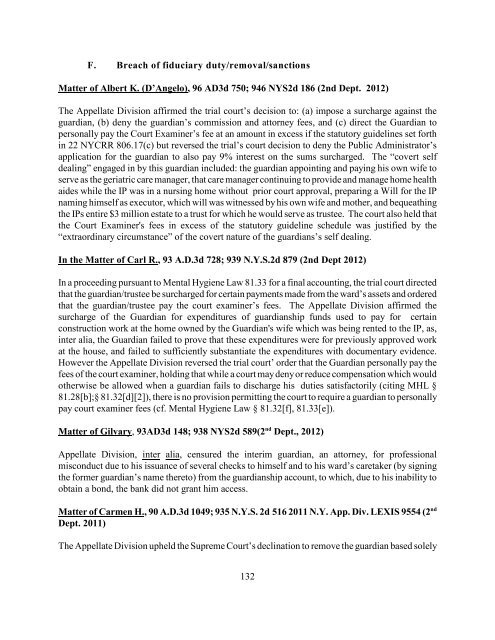MHL ARTICLE 81 - New York State Unified Court System
MHL ARTICLE 81 - New York State Unified Court System
MHL ARTICLE 81 - New York State Unified Court System
Create successful ePaper yourself
Turn your PDF publications into a flip-book with our unique Google optimized e-Paper software.
F. Breach of fiduciary duty/removal/sanctions<br />
Matter of Albert K. (D’Angelo), 96 AD3d 750; 946 NYS2d 186 (2nd Dept. 2012)<br />
The Appellate Division affirmed the trial court’s decision to: (a) impose a surcharge against the<br />
guardian, (b) deny the guardian’s commission and attorney fees, and (c) direct the Guardian to<br />
personally pay the <strong>Court</strong> Examiner’s fee at an amount in excess if the statutory guidelines set forth<br />
in 22 NYCRR 806.17(c) but reversed the trial’s court decision to deny the Public Administrator’s<br />
application for the guardian to also pay 9% interest on the sums surcharged. The “covert self<br />
dealing” engaged in by this guardian included: the guardian appointing and paying his own wife to<br />
serve as the geriatric care manager, that care manager continuing to provide and manage home health<br />
aides while the IP was in a nursing home without prior court approval, preparing a Will for the IP<br />
naming himself as executor, which will was witnessed by his own wife and mother, and bequeathing<br />
the IPs entire $3 million estate to a trust for which he would serve as trustee. The court also held that<br />
the <strong>Court</strong> Examiner's fees in excess of the statutory guideline schedule was justified by the<br />
“extraordinary circumstance” of the covert nature of the guardians’s self dealing.<br />
In the Matter of Carl R., 93 A.D.3d 728; 939 N.Y.S.2d 879 (2nd Dept 2012)<br />
In a proceeding pursuant to Mental Hygiene Law <strong>81</strong>.33 for a final accounting, the trial court directed<br />
that the guardian/trustee be surcharged for certain payments made from the ward’s assets and ordered<br />
that the guardian/trustee pay the court examiner’s fees. The Appellate Division affirmed the<br />
surcharge of the Guardian for expenditures of guardianship funds used to pay for certain<br />
construction work at the home owned by the Guardian's wife which was being rented to the IP, as,<br />
inter alia, the Guardian failed to prove that these expenditures were for previously approved work<br />
at the house, and failed to sufficiently substantiate the expenditures with documentary evidence.<br />
However the Appellate Division reversed the trial court’ order that the Guardian personally pay the<br />
fees of the court examiner, holding that while a court may deny or reduce compensation which would<br />
otherwise be allowed when a guardian fails to discharge his duties satisfactorily (citing <strong>MHL</strong> §<br />
<strong>81</strong>.28[b];§ <strong>81</strong>.32[d][2]), there is no provision permitting the court to require a guardian to personally<br />
pay court examiner fees (cf. Mental Hygiene Law § <strong>81</strong>.32[f], <strong>81</strong>.33[e]).<br />
nd<br />
Matter of Gilvary, 93AD3d 148; 938 NYS2d 589(2 Dept., 2012)<br />
Appellate Division, inter alia, censured the interim guardian, an attorney, for professional<br />
misconduct due to his issuance of several checks to himself and to his ward’s caretaker (by signing<br />
the former guardian’s name thereto) from the guardianship account, to which, due to his inability to<br />
obtain a bond, the bank did not grant him access.<br />
nd<br />
Matter of Carmen H., 90 A.D.3d 1049; 935 N.Y.S. 2d 516 2011 N.Y. App. Div. LEXIS 9554 (2<br />
Dept. 2011)<br />
The Appellate Division upheld the Supreme <strong>Court</strong>’s declination to remove the guardian based solely<br />
132

















